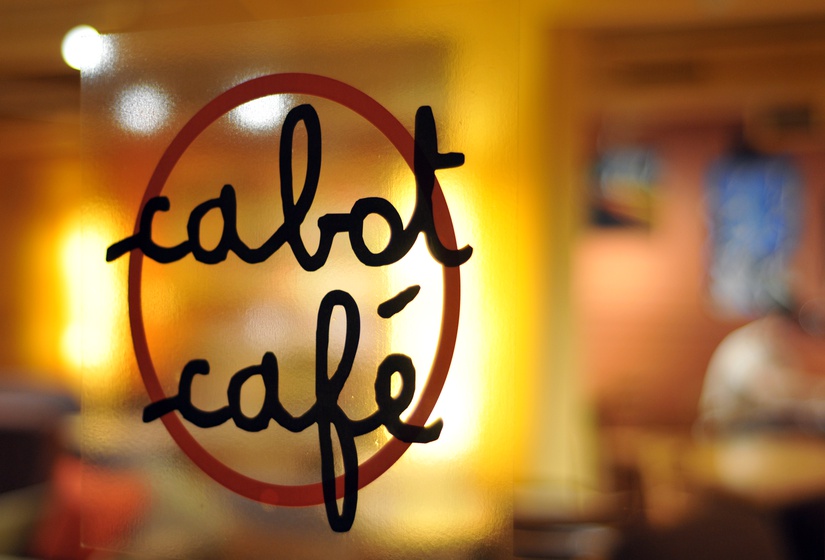{shortcode-d81bb33ce464a7c7e596e0c504d882471280da29}
{shortcode-34e8f2b114f673286f89210f17c56443a91cd7ed}abot Café is a centerpiece of undergraduate life in the Radcliffe Quadrangle. Nestled in the basement of Cabot House, it is staffed and run by undergraduates and open until 1 a.m. Saturday through Thursday, making it a perfect late-night study or hangout spot.
This year, however, the cafe has yet to open.
The string lights that hang from the walls, the cursive handwriting on a blackboard spelling out that day’s drinks, and the themed nights and live performances: All of it has been shuttered. The door is locked and the blinds are closed.
Cabot Café’s Finance Manager, David P. Arena ’24, says that there is not yet a set opening date. The delay, he says, is in part because of new regulatory processes that caught workers off guard.
Arena is one of the cafe’s three student managers. Last year, he tells us, Harvard’s Environmental Health and Safety department required one manager, who would need to be present in the cafe at all times, to have food safety, choke saving, and allergen training certifications.. This year, however, the department is requiring each of the three managers to have all of these certifications before scheduling a preliminary inspection.
Harvard University Campus Services spokesperson Michael D. Conner stated in an email that the preliminary inspection is being conducted to ensure a smoother permitting process with the City of Cambridge. While House grilles are only required to have proof of at least one manager’s certifications to obtain a permit, he writes, “this year, EH&S requested all managers submit their certifications for our records which will help ensure we have appropriate documentation during routine inspections.”
Arena says these certifications are costly and exams are offered infrequently, delaying the process of obtaining them. Harvard offers a combined food safety class and exam just once per semester. Otherwise, students must prepare for and take the exam on their own time, which costs $100, according to Arena.
For Cabot Café, Arena says, “Both other managers ended up having conflicts on the date, which was back in September. So it’s been really challenging for them to fit in studying for the exam.” He further notes that the ChokeSaver class is not offered at Harvard, requiring managers to take it elsewhere.
The confusion and delay have caused frustration among both cafe staff and students who appreciate the space to grab a drink and relax. Furthermore, the cafe’s extended closure this year has caused uncertainty about its reliability.
“Some freshmen knocked on the door, and they were confused why it was closed,” Victoria Y. Wang ’24, who worked at the cafe last year, recalls. “I hope this won’t have lasting impacts. Because now people are unsure about whether or not the cafe is going to be consistently open.”
Despite these setbacks, the cafe appears poised to open soon. The student leaders are waiting on the certification of just one more staff member.
“I believe after that point, we’ll be ready to open,” Arena says. “We’ve already done everything else, like clearing it with the House administrators and faculty deans of Cabot House.”
Another challenge that Cabot Café faces is its budget. Arena says while inflation and wages have increased due to Covid-19, Cabot’s budget for the cafe has not. Student leaders met with the House’s faculty deans earlier this year to discuss how to reduce expenditures, and the cafe has had to raise prices to keep up with costs.
Still, Arena feels supported by the Cabot House administration.
“They are very much on our side,” he says. “They really want to see the Cabot Café opened up and serving students again.”
Not only is the cafe meaningful to the faculty deans and the students who frequent it, it’s also had a major impact on the staff. Cabot Café is “where I learned how to be a barista,” Wang says, “so it’s very close to my heart.”
Arena echoes these sentiments.
“I just hope that it comes through that we are working really hard to make this happen and we really want it to be open,” he says.
He says he remains optimistic and excited for the future. “It just really makes me happy to see people smile and get excited that they have this cool, friendly, inviting space at a late night when everybody’s trying to do work or socialize. There’s really something for everybody at the Cabot Café.”


